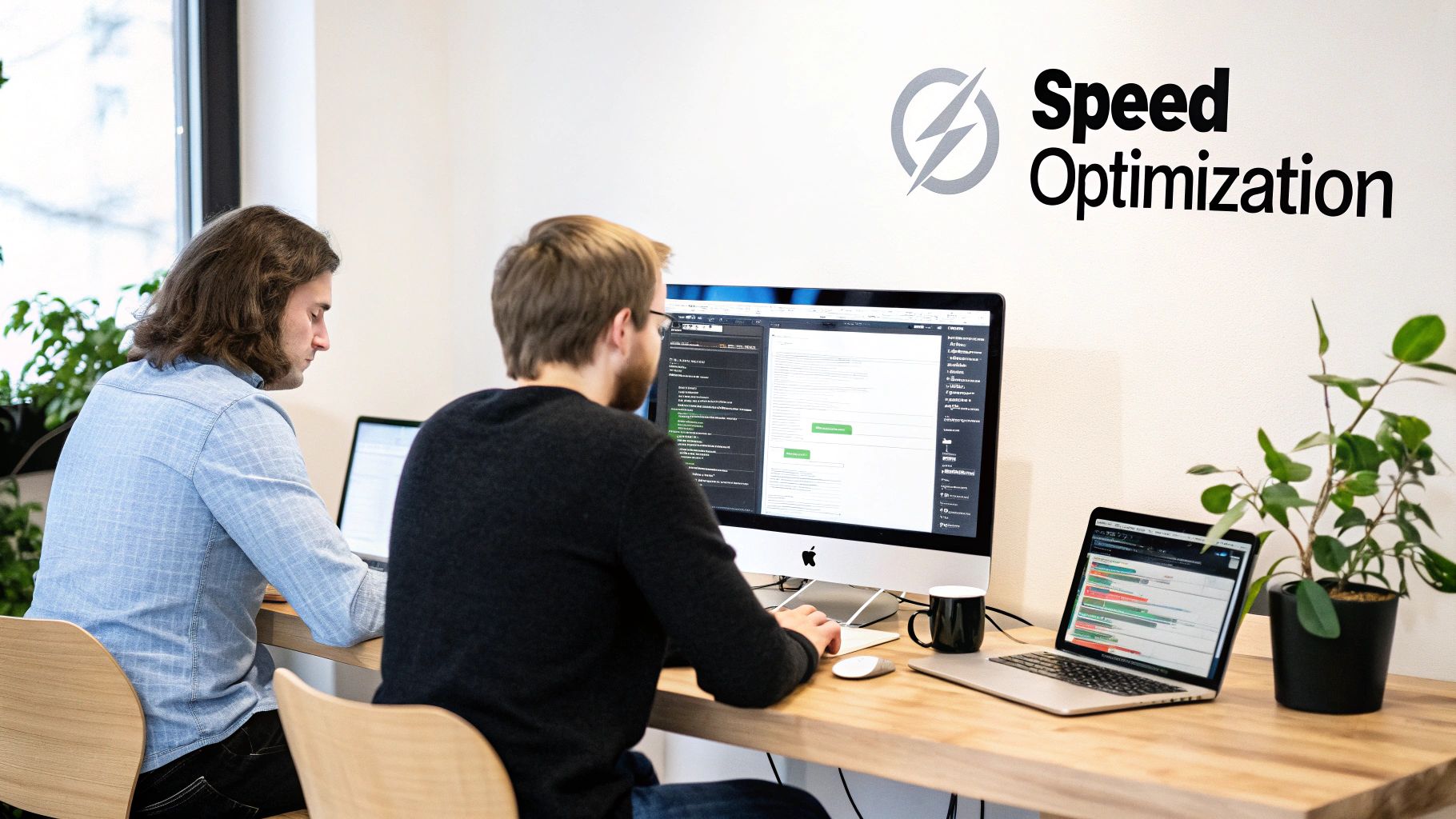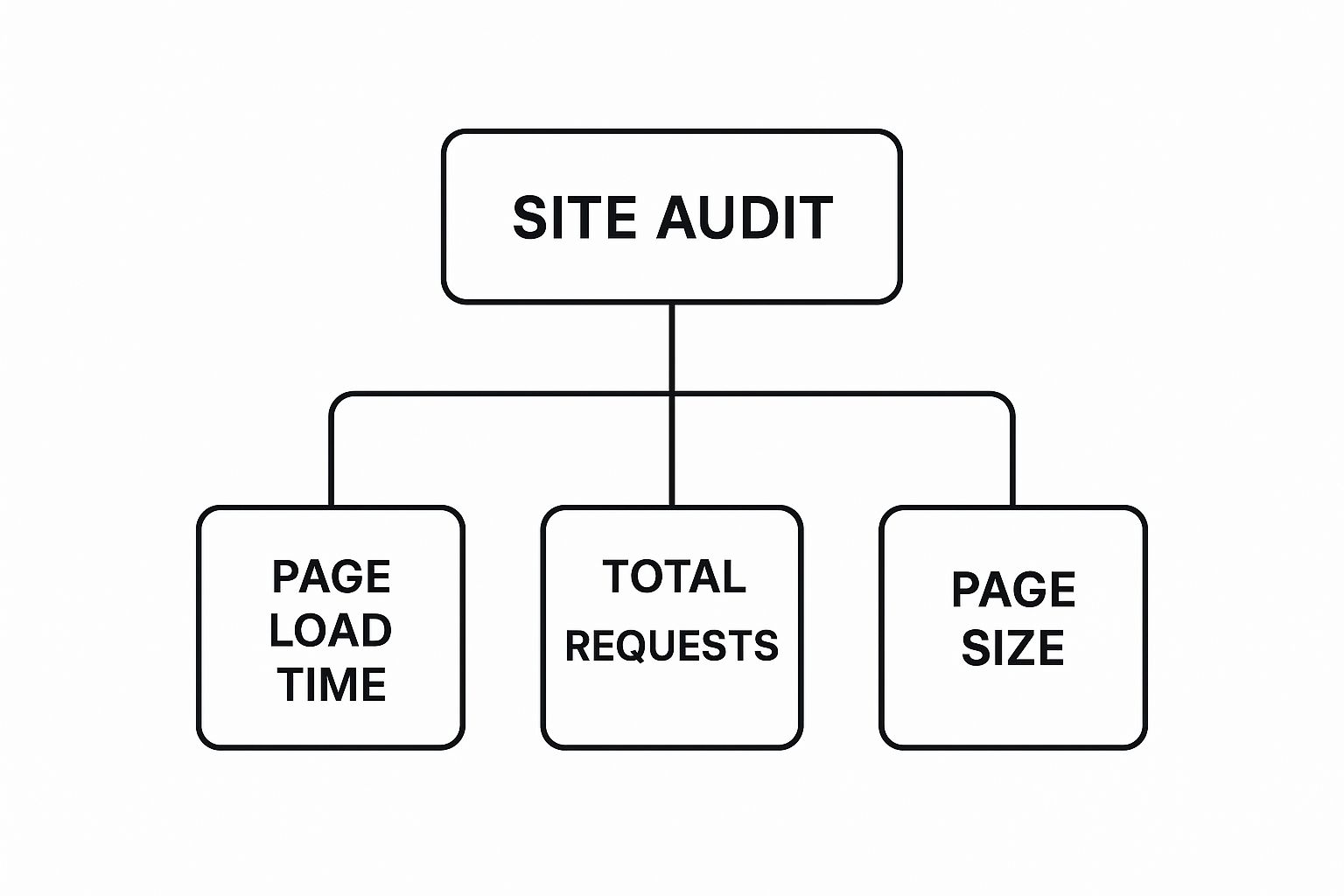A slow website can be incredibly frustrating, not just for you but for your visitors too. It's more than just a small tech issue; it's like a closed door between your business and your potential customers. A professional WordPress speed optimisation service is all about getting that door wide open, ensuring your site is fast, smooth, and welcoming for everyone who stops by.
Why a Faster Website Is So Important

We’ve all been there. You click a link, full of interest, only to be met with a stubbornly blank screen. How long do you wait before hitting the 'back' button? For most people, it's just a few seconds. Every moment your site takes to load is another chance for a potential customer to give up and head somewhere else.
This isn’t just about technology; it’s about human experience. A sluggish website can make a poor first impression, making your brand feel unreliable or unprofessional. It directly impacts how people perceive your business.
The Real-World Cost of a Slow Site
The consequences of poor performance aren't just theoretical—they can genuinely affect your bottom line. A slow WordPress site doesn't just annoy visitors; it can actively hinder your business goals.
Let's break down what a slow website might be costing you:
- Lost Visitors and Sales: In the online world, speed is everything. A delay of just one second in page load time can lead to a significant drop in conversions because people simply won’t wait around.
- Higher Bounce Rates: A 'bounce' is when someone visits one page on your site and then leaves without clicking anything else. Slow loading is a primary reason for high bounce rates, which can signal to search engines that your site isn't meeting user needs. We have a helpful guide on how to reduce website bounce rate if you'd like to learn more.
- Damaged SEO Rankings: Google wants to provide users with the best possible experience, and that includes speed. Site speed is a key ranking factor, meaning a slow site can be pushed down in search results, making it harder for new customers to find you.
Think of it this way: a slow website is like having a shop with a door that's incredibly difficult to open. No matter how great your products are inside, most people won't bother struggling to get in.
Bringing in a WordPress speed optimisation service is about making that door easy to open. It’s about creating an inviting and efficient journey that encourages people to stay, explore what you have to offer, and ultimately become a customer.
So, What Do You Actually Get with a Speed Optimisation Service?
Hiring an expert to speed up your website can feel a bit like handing your car keys over to a mechanic. You know something's not quite right, but you're not entirely sure what goes on under the bonnet. A good WordPress speed optimisation service is much more than a quick tune-up; it's a careful and thorough process to make every part of your site work faster and more efficiently.
Think of it as a complete health check for your website. The process usually starts with a deep-dive audit. Experts use specialised tools to analyse everything, from how quickly your server responds to how large your images are. This first step is all about finding the exact bottlenecks that are causing the slowdown.
It's a process driven by data, not guesswork.
It’s More Than Just a Caching Plugin
A common myth is that simply installing a caching plugin will solve all your speed problems. While caching is incredibly helpful—it’s like a coffee shop having your favourite drink ready the moment you walk in—it's only one piece of a much larger puzzle. A proper optimisation service goes much deeper.
Here are some of the key areas they'll look at:
- Server and Hosting Health: Is your hosting plan powerful enough for your needs? Are the server settings configured for a high-performing WordPress site? A slow server is like building a house on shaky foundations.
- Code Minification (CSS & JavaScript): Your site might be forcing visitors to download code that isn't even being used on a particular page. Experts find and remove this "code bloat," making sure your site is as lean and efficient as possible.
- Database Health: Over time, your WordPress database can get cluttered with old post revisions, trashed comments, and other digital dust. A clean, streamlined database can retrieve information much faster.
- Image and Media Optimisation: Oversized, uncompressed images are one of the biggest causes of slow websites. A service will compress them without losing visual quality and use modern techniques like lazy loading.
The Real-World Business Results
All this technical work translates directly into real business benefits. For UK businesses, a faster website isn't just a nice-to-have; it's a powerful tool for growth. Recent studies found that WordPress sites that undergo professional speed optimisation can see an average traffic boost of 20%. On the other hand, even a one-second delay in page load time can reduce conversions by 7%—a significant number for any business. You can explore more data on the impact of WordPress speed.
Ultimately, a WordPress speed optimisation service provides a clear return on investment. It's about creating a better experience for your visitors, boosting your visibility on Google, and ensuring your digital presence is as professional and efficient as the rest of your business. The goal is simple: to give people a seamless experience that makes them want to stay, browse, and connect with you.
The Core Pillars Of A Lightning-Fast Website
A genuinely fast website isn't the result of one magic trick or a single "speed" plugin. It’s built on several key pillars, all working together to create that snappy, seamless experience your visitors have come to expect. Understanding these core components can help you have more meaningful conversations with any WordPress speed optimisation service.
Think of your website like a high-performance car. It needs more than just a powerful engine; you also need a lightweight frame and an efficient fuel system to win the race. Let's break down the key pillars that get your site running in top form.
Smart Caching: Your Site's Digital Memory
Imagine a barista who remembers your usual coffee order. The moment you walk in, they start making it, saving you the time and effort of ordering. That's a great way to understand what caching does for your website.
Without caching, every time someone visits your site, WordPress has to build the page from scratch. It finds information in the database, pieces the content together, and processes code before anything can be shown. Caching avoids all this by creating a ready-made, static version of your pages. When a visitor arrives, the server can deliver this pre-built version almost instantly.
There are many great tools for this, but finding the right one is key. If you're looking to dive deeper, we've broken down some of the best WordPress caching plugins available.
Efficient Image Optimisation
Let's be honest: large, uncompressed images are probably the most common reason for a slow website. They're like trying to sprint while carrying a heavy backpack—they just weigh everything down.
Image optimisation is all about reducing the file size of your images without making them look blurry or pixelated. A professional service has a whole toolkit for this:
- Compression: Smartly reducing the file size of every image.
- Correct Sizing: Serving images that are no larger than they need to be for a visitor's screen.
- Modern Formats: Using next-gen image formats like WebP, which offer the same quality in a much smaller file than older formats like JPEG or PNG.
The image below shows how important factors like page size—which is heavily influenced by images—are to the overall performance picture.

As you can see, reducing your page size through techniques like image optimisation has a direct, positive impact on your page load time. It's one of the first things any good audit will look at.
Clean Code and a Healthy Database
The code from your theme and plugins is like the blueprint for your website. If that blueprint is messy, cluttered, or full of outdated instructions, it simply takes the server longer to figure out what it's supposed to do.
A clean codebase involves minification, which is just a technical term for stripping out all the unnecessary characters from code files (like spaces and comments) without affecting how they work. This makes the files smaller and quicker for browsers to download. Just as important is a tidy database. Over time, it can get bloated with old post revisions and spam comments, slowing everything down.
A Robust Hosting Environment
Finally, your hosting is the foundation your website is built on. If that foundation is shaky or slow, nothing you build on top of it will ever be truly fast.
Your hosting provider dictates the raw power and resources available to your site. A quality hosting environment gives you fast server response times, up-to-date software, and the ability to handle sudden traffic spikes without grinding to a halt.
Let's look at the core components of a professional optimisation service in a bit more detail.
Core Components Of WordPress Speed Optimisation
When you hire an expert, they won't just tinker with one thing. They'll take a holistic approach, looking at several interconnected areas to get the best results.
| Optimisation Area | What It Means | Why It's Critical For Speed |
|---|---|---|
| Caching Strategy | Setting up a system to store pre-built versions of your pages. | Massively reduces the work your server has to do for each visitor. |
| Image Optimisation | Compressing, resizing, and converting images to modern formats. | Images are often the heaviest part of a page; optimising them is a huge win. |
| Code Minification | Removing unnecessary characters from CSS, JavaScript, and HTML files. | Makes code files smaller, leading to faster download and processing times. |
| Database Cleanup | Removing old post revisions, spam, and other unnecessary data. | A clean database responds to queries faster, speeding up page generation. |
| Hosting & Server | Ensuring the server itself is fast, modern, and properly configured. | A slow server will always be a bottleneck, no matter how optimised the site is. |
| Plugin/Theme Audit | Identifying and replacing slow or poorly coded plugins and themes. | Eliminates code bloat and conflicts that can drag your site down. |
A comprehensive service looks at all these pieces of the puzzle to ensure every part of your website is working as efficiently as possible.
How Your Themes And Plugins Impact Site Speed

It’s easy to think of your WordPress theme as just a coat of paint for your website—the colours, fonts, and layout that create its look. But in reality, your theme is the foundation everything else is built on. And unfortunately, not all foundations are created equal.
Many themes on the market come packed with features you might never use, from complex image sliders to every page builder integration imaginable. Each of these bells and whistles adds more code. This is often called 'code bloat', and it’s a bit like trying to run a marathon while wearing a heavy winter coat. All that extra weight just slows you down.
A speedy website begins with a lightweight, well-coded theme. It provides a clean, efficient base, making sure your site isn’t weighed down before you’ve even published your first post.
The Problem With Poorly Coded Themes
Choosing the right theme from the start can save you a world of frustration later on. A theme built for speed makes a real, measurable difference. In fact, UK WordPress sites using lightweight themes like Astra or GeneratePress load, on average, 0.7 seconds faster. When you remember that most people will leave a site that takes longer than two seconds to load, that fraction of a second becomes incredibly valuable. You can read more about how fast themes deliver results.
This is why a professional WordPress speed optimisation service will nearly always begin by looking at your theme. They can determine if it's the main cause of your slow speeds and either suggest better alternatives or, if possible, help clean up the existing code.
How Plugins Can Slow Your Site to a Crawl
Plugins are one of the most powerful features of WordPress. They allow you to add incredible new functions with just a few clicks. But they're also one of the most common reasons a website becomes painfully slow. It's a classic case of too much of a good thing.
The problem isn't just about how many plugins you have installed; it's about their quality. A single, poorly coded plugin can do more damage to your site's performance than ten well-made ones combined.
Here’s how they can drag your site down:
- Adding extra HTTP requests: Every plugin that needs to load its own scripts and stylesheets adds more files that a visitor’s browser has to download.
- Running complex database queries: Some plugins are constantly 'talking' to your database, putting a significant strain on your server's resources.
- Introducing code conflicts: When plugins don't work well together, the resulting clashes can cause errors and major performance drops.
A common mistake is to keep plugins installed "just in case" they're needed later. Every inactive plugin is still a potential security risk and can leave behind junk in your database that weighs your site down.
A thorough plugin audit is a key part of any good speed optimisation project. An expert will go through your plugins one by one, testing to see which ones are creating bottlenecks. From there, they can help you find leaner alternatives or simply remove what you don’t need. This careful pruning ensures your site only runs the code it absolutely has to, resulting in a faster, more reliable experience for your visitors.
Choosing The Right Speed Optimisation Partner
Deciding to bring in professional help for your WordPress site's speed is a smart move, but picking the right team can feel a little daunting. You're not just sharing your login details; you're trusting someone with a crucial part of your online presence. The goal is to find a partner who is transparent, methodical, and genuinely invested in getting you great results.
Think of it like hiring a skilled mechanic. You wouldn't just hand the keys to the first person you meet. You’d want to see their workshop, look at their previous work, and feel confident they know exactly what they're doing. A trustworthy expert will be happy to walk you through their entire process before you commit to anything.
Key Questions To Ask Any Potential Partner
To help you find a great fit, it's useful to have a few clear questions ready. How they answer will tell you a lot about their expertise and their approach.
Here are a few essentials to get the conversation started:
- What does your audit process involve? A deep-dive audit is the foundation of any successful speed project. A professional should be able to tell you which tools they use and what performance metrics they'll be looking at.
- Can you show me some real-world examples? Seeing before-and-after results, especially for websites in your industry, is the best proof of their skill.
- How will you report back on the improvements? Look for clear, straightforward reports that focus on meaningful metrics like load time and Core Web Vitals, not just a vague "performance score."
- What’s the plan if a future update slows everything down again? This question reveals their approach to long-term site health and ongoing support, which is just as important as the initial fix.
A word of caution: be wary of anyone promising a #1 ranking on Google or a perfect "100/100" score. While scores are useful benchmarks, a true professional focuses on genuine, real-world speed improvements that make a difference to your visitors, not just chasing a number for the sake of it.
Understanding Pricing Models
As you start your search, you'll find that agencies and freelancers price their services in a few different ways. Understanding these models can help you figure out what makes the most sense for your budget and goals.
Comparing Service Provider Pricing Models
Here’s a simple breakdown of the common pricing structures you're likely to see when looking for a WordPress speed expert.
| Pricing Model | Best For | Typical Cost Range (UK) |
|---|---|---|
| One-Off Project Fee | Websites that need a single, comprehensive speed overhaul to fix existing issues. | £300 – £1,500+ |
| Monthly Retainer | Businesses that want continuous performance monitoring and regular tune-ups. | £150 – £500+ per month |
| Pay-Per-Performance | Situations where you prefer to pay only when specific, pre-agreed targets are met. | Varies greatly based on goals |
Ultimately, the best partner is someone who communicates clearly, sets realistic expectations, and provides transparent reports you can actually understand. Taking a little extra time to ask the right questions will help you make a decision you feel confident in.
If you have any questions about finding the right fit for your site, please feel free to get in touch with our team.
Life After Optimisation: Keeping Your Site Fast
Getting your website to lightning-fast speeds is a fantastic achievement, but the work doesn't stop there. Think of it like a finely tuned car; it needs regular maintenance to keep performing at its best. Your website is a dynamic tool, constantly changing every time you publish a blog post, add a plugin, or upload new images.
Over time, these small updates can add up, slowly undoing the great work of the initial optimisation. This is why ongoing performance monitoring is so helpful. It’s not about obsessing over every millisecond; it’s about being proactive and staying ahead of any potential issues.
Staying on Top of Your Speed
Regularly checking in on your site's health is the best way to ensure it stays fast for every visitor. The good news is, this doesn't have to be a complicated task.
Here are a few key things to keep an eye on:
- Core Web Vitals: These are three key metrics Google uses to measure real-world user experience. Keeping them in the "good" range is great for both your SEO and your visitors.
- Load Times: Is your homepage still loading in under two seconds? What about your key product or service pages?
- New Plugins: Before you install that shiny new plugin, take a moment to consider its potential impact. A single poorly-coded plugin can become a major bottleneck.
Staying ahead of performance issues means you catch small problems before they become big headaches. A simple monthly check-in can prevent a major slowdown down the road.
You can learn more about the best website performance monitoring tools that make it easy to keep an eye on these metrics. A good WordPress speed optimisation service should also provide you with simple, easy-to-understand reports to show you how your site is performing.
Maintaining a fast website is a marathon, not a sprint. But with the right habits in place, it’s a race you can easily win.
Frequently Asked Questions

It's completely normal to have questions before you invest in a WordPress speed optimisation service. It’s an important step for your website, and you want to get it right. We've gathered some of the most common queries we hear to help you feel more confident about the process.
Let's clear up some of the usual uncertainties.
How Long Does A Project Usually Take?
Every website is unique, but a typical optimisation project usually takes between one to three weeks. This timeframe allows for a careful, methodical approach that delivers lasting improvements.
Here’s a quick look at what that involves:
- Deep-Dive Audit: We start by thoroughly investigating your site to pinpoint exactly what's causing the slowdown.
- Implementation: With a clear plan, our team then gets to work applying the necessary fixes—from tweaking code to reconfiguring server settings.
- Testing and Monitoring: After the changes are made, we carefully monitor and test everything to make sure the speed gains are stable and consistent.
Any reputable service will give you a clear, realistic timeline from the start, so you're never left in the dark.
Can I Just Use A Plugin To Speed Up My Site?
Plugins can certainly help, and for many people, they're a good first step. But they often act as a plaster on a deeper issue. A plugin is like a useful DIY tool, whereas a professional service is like an experienced craftsperson with a full workshop of specialised equipment.
A dedicated service goes far beyond what a single plugin can do. They can tackle complex, underlying problems like inefficient database queries, bloated theme code, server-level bottlenecks, and those frustrating plugin conflicts that no one tool can resolve on its own.
Will I Have To Change My Hosting Provider?
Possibly, but not always. Your web hosting is the foundation your entire website is built on. If that foundation is weak, nothing built on top of it will ever be truly fast.
A thorough WordPress speed optimisation service will always begin by analysing your hosting environment. If your server is the main bottleneck, they’ll be upfront about it. If a move is needed, they will explain exactly why and can help guide you toward a provider that’s a better fit for your site's needs, without breaking the bank.
At LINX Repair Websites, we take the guesswork out of website performance. Our team is ready to help you create a faster, more reliable online presence. Contact us today to learn more about our risk-free services.
